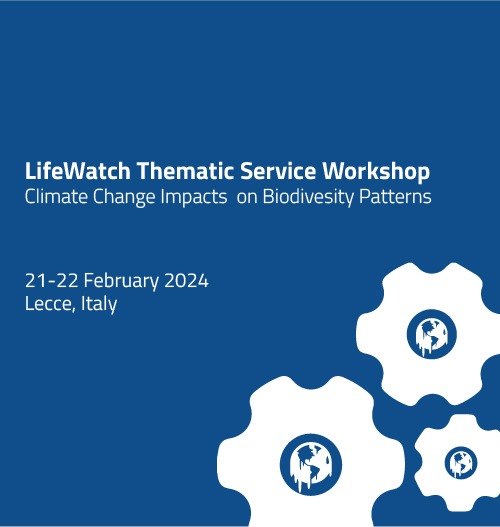Ecological responses to climate change: implications on human well-being

Resources
14:00 – 14:15 | Welcome and Introduction to LifeWatch Thematic Core Service (TCS) by Antonello Provenzale (CNR) and Alberto Basset (University of Salento)
14:15 – 14:45 | Individual Metabolic Responses to Climate Warming Depend on Biological and Ecological Context by Doug S. Glazier (Juniata College, USA; Online)
14:45 – 15:00 | Discussion
15:00 – 15:15 | Using Artificial Intelligence for estimating the Responses of coastal lagoons to Climate Change by Piero Lionello (University of Salento; In-Person)
15:15 – 15:30 | Energetic and Behavioral Responses of Aquatic Ectotherms to Projected Climate Change by Milad Shokri (University of Salento; In-Person)NR; Online) e/o Pasquale Bove (CNR; In-Person)
15:30 – 15:45 | Climate Change Effects on Animal Presence in the Massaciuccoli Lake Basin by Gianpaolo Coro (CNR; Online) e/o Pasquale Bove (CNR; In-Person)
15:45 – 16:00 | Empowering Environmental Science and Climate Change Study with DataLabs: LifeWatch’s Collaborative Coding Platform for Biodiversity and Ecosystem Research by Francesco De Leo (CNR, In-Person)
16:00 – 16:15 | Discussion
16:15 – 16:45 | Coffee break
16:45 – 17:00 | Ecological Resilience of Mediterranean Forests to Climate Change and Wildfires by Mara Baudena (CNR; Online)
17:00 – 17:15 | Cellular Automata Models for Wildfire-Vegetation Interaction by Paolo Fiorucci (Cima Research Foundation; In-Person)
17:15 – 17:30 | A Vegetation Simulation Platform in a Global Change Context by Alessio Collalti (CNR; Online)
17:30 – 17:45 | Discussion
17:45 – 18:00 | Identifying the environmental drivers of carbon fluxes – a step to assess climate change impacts on ecosystems by Marta Magnani (CNR; online)
18:00 – 18:15 | Modelling of Soil Organic Carbon dynamics in wetlands by Carmela Marangi (CNR; In-Person)
18:15 – 18:30 | Monitoring aquatic primary producers response to Climate Change: The Phytoplankton VRE by Jessica Titocci (CNR; In-Person)
18:30 – 19:00 | Discussion and Conclusion
09:30 – 10:00 | Wrap-up by Alberto Basset and Antonello Provenzale
10:00 – 11:00 | Community requirements and construction priorities
Topic 1 – What is Already in Place in Terms of Services (Within and Outside of LifeWatch ERIC)?
Topic 2 – Community’s Needs and Requirements: How Can We Identify These?
11:00 – 11:30 | Coffee Break
11:30 – 12:30 | Organising the Ecological responses to climate change working group
Topic 3 – Launch and lines of operation
Topic 4 – Collaborations and Project Research Initiatives
12:30 – 13:00 | Closing Remarks and Future Directions
Summarize key insights from the workshop and discuss potential avenues for future collaborations and research initiatives.
Antonello Provenzale & Alberto Basset
Welcome and Introduction to LifeWatch Thematic Core Service (TCS)
Doug S. Glazier
Individual Metabolic Responses to Climate Warming Depend on Biological and Ecological Context
Paolo Lionello
Using Artificial Intelligence for estimating the Responses of coastal lagoons to Climate Change
Milad Shokri
Energetic and Behavioral Responses of Aquatic Ectotherms to Projected Climate Change
Gianpaolo Coro & Pasquale Bove
Climate Change Effects on Animal Presence in the Massaciuccoli Lake Basin
Francesco De Leo
Empowering Environmental Science and Climate Change Study with DataLabs: LifeWatch’s Collaborative Coding Platform for Biodiversity and Ecosystem Research
Mara Baudena
Ecological Resilience of Mediterranean Forests to Climate Change and Wildfires
Paolo Fiorucci
Cellular Automata Models for Wildfire-Vegetation Interaction
Alessio Collalti
A Vegetation Simulation Platform in a Global Change Context
Marta Magnani
Identifying the environmental drivers of carbon fluxes – a step to assess climate change impacts on ecosystems
Carmela Marangi
Modelling of Soil Organic Carbon dynamics in wetlands
Jessica Titocci
Monitoring aquatic primary producers response to Climate Change: The Phytoplankton VRE
Ecosystems and biodiversity are currently under threat owing to many different manageable and unmanageable anthropic pressures. Among these, climate changes are unmanageable pressures, which can have direct impact on ecosystems and biodiversity, pushing populations to abandon traditional distribution areas and move to new territories, favouring the spread of allochthonous species, reducing the survival of endemic and/or specialised organisms, leading to impoverished ecosystems more prone to collapse. Ecological responses to climate change include also increasing individual level respiration rates, altering species interaction networks and ecosystem process rates, leading to lower net primary productivity and standing biomass. Climate change can have indirect amplifying effects on other anthropogenic threats, such as pollution, land degradation and fragmentation, and the diffusion of invasive species; ecological responses to climate change can also have indirect effects on human well-being.
In this workshop, organised with LifeWatch Italy, we intend to explore the role of LifeWatch ERIC in developing a suite tool and services on data curation, data analysis and modelling, to better understand ecological responses to climate change, describe scenarios of biodiversity and ecosystem functioning change under climate change, considering in particular how such changes affect ecosystem integrity and to what extent they could harm and decrease the benefits that healthy ecosystems provide to human beings.
Since ecosystems include biotic and abiotic components that form a complex network of interactions, particular attention will be given to biological and mathematical models that consider:
- The interplay of biological and physical-chemical-geological aspects, including the interaction of biodiversity and geodiversity, the role of organisms as ecosystem engineers, and the effects of climate change on biogeochemical cycles, with special attention to the water and carbon cycles; and,
- The mechanisms underlying the upscaling of individual level responses to climate change and global warming to the ecosystem and global level responses of ecosystem functioning and services, including net primary productivity and standing biomass.
